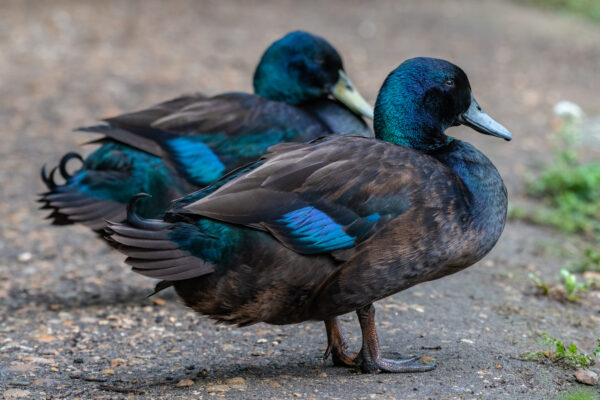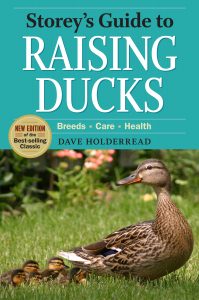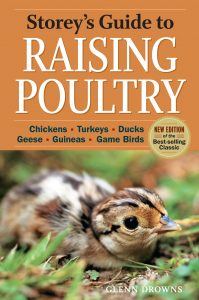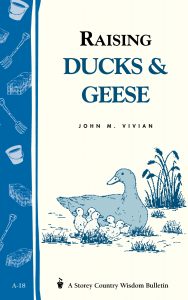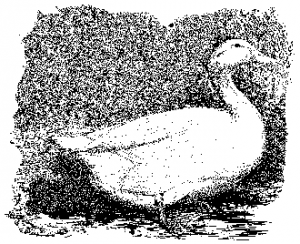
Breed Facts
Status:
Watch
Use:
Meat, Eggs, Pets, Exhibition
Egg Color:
Black fading to white late in the season
Egg Size:
Large
Weight:
Male – 6.5-8 lbs. Female – 6-7.5 lbs.
Temperament:
Docile, Calm
Characteristics:
Prone to predation; Prefers cool climate
CAYUGA DUCK
Cayuga ducks originate from ducks obtained in Orange County, New York by John S. Clark and introduced to Cayuga County in the Finger Lakes region of New York circa 1840. The ducks (and the county) were named “Cayuga” after the native people of that area. They became popular in the region, and in 1874 the Cayuga duck was accepted into the American Poultry Association’s Standard of Perfection. Duck was a popular dish in the large cities of the Northeast, and Cayuga ducks were raised in large numbers on duck farms throughout New York. In the 1890s, duck production shifted to the white-feathered Pekin duck, leading to the decline of the Cayuga duck breed.
The Cayuga is a medium-sized breed. They are long and elegant, and their body carriage is slightly elevated in front. They have a broad, full, and prominent breast with a deep, long, and broad body and large, short thighs. The head is oval, and the bill is slightly flattened along the top line. Their medium-length neck is slightly arched. The stiff plumage of the Cayuga is black with an iridescent green/blue/purple sheen in the sunlight; they may develop white mottling as they age. Sex feathers on drakes are well-curled.
The mature Cayuga averages 7-8 lbs. and can obtain most of its diet from foraging when given appropriate areas to explore for food. They fatten easily, and can be harvested as early as 8 weeks though some suggest the best results come with waiting until 12 weeks. The meat of the Cayuga is reputed to be of excellent taste, tender, and of fine quality, but the carcass can be difficult to clean because of their dark feathering. Some resolve this problem by skinning the ducks rather than plucking.
Cayuga ducks can lay 100-150 large eggs per year that can be used for general eating and baking purposes. Eggs are initially black in color, but as the season progresses, egg color lightens to gray or greenish-blue, and eventually they become white. They tend to choose seasonal rather than life mates.
The Cayuga is recognized as one of the hardiest of the domestic ducks and are easily tamed if hand raised. Generally of even temperament, ducks can become more assertive while sitting on eggs. They tolerate the harsh winters of the northeast but need access to shade in hot weather. Cayugas are not good fliers. They are a quiet breed that is good for urban or suburban settings; hens tend to be noisier than drakes. The breed is sometimes used for dog herding trials as they flock well.
The Cayuga is recognized as one of the hardiest of the domestic ducks and are easily tamed if hand-raised. They tolerate the harsh winters of the northeast and can produce many offspring. The Cayuga averages 7 to 8 pounds and can obtain most of its diet from foraging when given appropriate areas to explore for food. The meat of the Cayuga is reputed to be of excellent taste and fine quality but the carcass can be difficult to clean because of their dark feathering. Some resolve this problem by skinning the ducks rather than plucking. Cayuga ducks can lay 100 to 150 eggs per year that can be used for general eating and baking purposes. Eggs are initially black in color, but as the season progresses, egg color lightens to white. The plumage of the Cayuga is uniformly greenish-black and may become mottled with white as they age.
Did you know:
Livestock Conservancy Program staff have more than 175 cumulative years of heritage breed experience. We hold Ph.D.s in veterinary medicine, genetics, and biology. We are the most experienced livestock conservation team in the world.

Breed Facts
Status:
Watch
Use:
Meat, Eggs
Egg Color:
Black fading to white late in the season
Egg Size:
Large
Market Weight:
6-7 lbs
Temperament:
Docile
You may be interested in…

